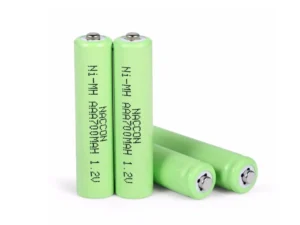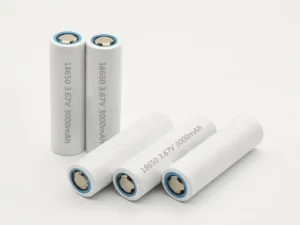Introduction:
NiMH VS lithium ion batteries, which one is better? It is the most argument that you usually come across when you think of batteries. Nowadays, the usage of batteries is widespread in daily life appliances and electronics. Therefore, choosing one of these two types is essential when you want your appliance to work for an extended period. Both batteries have their specification, their usage extent, and their drawbacks. So, this blog will cover the significant differences between the two types of batteries.
What is a NiMH battery? A small intro

Before starting with NiMH battery VS lithium ion, let’s clarify the NiMH batteries. You all would agree that mobiles and remote controllers are some essentials that everybody uses. These devices come with NiMH batteries. These rechargeable batteries can easily get recharged and are very affordable nowadays. So, any of you can purchase them whenever needed without worrying about the cost.
Moreover, there is something special about the design of the batteries, a leakproof feature. Thus, the chances of the battery getting explode over voltage differences reduce. Like the other batteries, it has two electrodes; a cathode with nickel hydroxide and an anode with hydrogen-absorbing alloys.
Every cell installed in the NiMH battery produces a voltage of approximately 1.2 Volts. Hence, it stores a high capacity of energy.
What is a lithium-ion battery? A short description

A lithium-ion battery works on the electrochemistry principle of the movement of lithium ions in the electrolyte. Manufacturers of this battery designed them with the most advanced system to deliver the best results. Also, it is a rechargeable battery.
Manufacturers often design a circuit in the batteries to control their input and output voltages. Thus, it is capable of producing a voltage of 3.6 volts. You won’t feel the eight of the battery because it has a lightweight feature. It encourages users to use them in various appliances.
The advantages and disadvantages of NiMH batteries
Let’s go through the NiMH battery advantages and disadvantages.
Advantages
-
Low maintenance
If the battery causes any short circuit or its component burns out, you shall look for another one. As the manufacturers designed it, the components require low maintenance. Therefore, you could use the battery for a long.
-
Life span
Once you have fully charged the NiMH battery, then it could last charging for a long period. Manufacturers designed it in a way that follows its charging for a hundred cycles.
-
Environmental friendly batteries
Sometimes, a battery’s environmental impact can concern you a lot. Therefore, you should know the environmental impact of the NiMH battery. The manufacturer design such batteries that pay no effect on the environment. None of the designed components cause a hazard to the environment.
-
Zero memory effect
If you are new to the term memory effect, let’s introduce you first. It is a phenomenon in which a battery might not be capable of holding the charge if you haven’t discharged fully. A NiMH battery is safe from this kind of problem. Thus, you can quickly recharge them without affecting the battery’s capacity.
Disadvantages
-
Leakages
NiMH batteries could easily encounter leakages and can stop working at any moment. Sometimes, you need to be more aware of the temperature the battery is operating on. For instance, it can weaken at extremely low or extremely high temperatures as its components get brittle. In such a situation, the risk of battery leakages always pops up.
-
Excessive self-discharging
What if you kept a NiMH battery in a drawer and forgot to use it for the next month? After a specific period, the battery loses its charging slowly. Experts say that it can lose its 20 percent charging after every 24 hours if it’s fully charged. Thus, heavy discharging rates make it impractical for users to use the battery.
-
Charging cycles
The charging or discharging of a NiMH battery revolves around 500 cycles. The reason behind this is due to the electrochemistry and the components in the circuit. As the process occurs, the battery releases hydrogen gas.
-
Weight
Another reason that limits the use of NiMH batteries is their weight. Heavy weight can sometimes make the battery incompatible with the devices.
The advantages and disadvantages of Lithium-ion batteries
Go through the advantages and disadvantages of lithium-ion batteries.
Advantages
-
Sizes
Well, you can use lithium-ion batteries in small devices easily because of their small sizes.
-
Life span
What makes these batteries a popular choice to use is their life span. You can overcharge and overuse the batteries; their capacity remains constant with zero decrease.
-
Fast charging
With the fast charging phenomenon, the batteries easily get fully charged very few times.
Disadvantages
-
Easily burst
Although you have an advantage of lithium-ion batteries that you can overcharge them, there is something you might not know! When you overcharge the batteries, then there is a high risk that its circuit could make the battery explode at any moment. Thus, you should always monitor their current and voltage values as a safety measure.
-
Cost
These batteries may be more costly than the other ones. Therefore, its cost might discourage you from its purchase.
-
Battery transportation issues
Transportation of li-ion batteries might come across great challenges as air transportation often implies restrictions on this transport.
NiMH VS lithium ion batteries– the major differences
After reading about the two batteries, you might be curious to know what makes them different. So, you can read this and clear all your doubts regarding them both. Remember that the batteries’ usage can let you choose one.
1. The ability of self-discharge
The first difference between lithium ion VS NiMH is the feature of self-discharge. This phenomenon concerns a battery releasing energy when you are not using it. Several factors like temperature effect, any leakage in the battery, or a chemical reaction to place over time can speed the discharge. Self-discharging rate for both types of batteries is low, but NiMH still has a bit higher rate.
With a high self-discharge rate nickel hydroxide battery, the battery loses its efficiency and life shortness. After the shortening of life, the battery will likely terminate very soon. You might have to seek its replacement after some period.
On the other hand, people favor lithium ion batteries because of their minimal self-discharge rate. That’s because of the efficient electrochemical system it works with. Hence, with the lower the self-discharge rate, the most negligible replacement you must make for the battery.
2. Charging and discharging rates
NiMH VS lithium ion batteries difference is about the charging and discharging rates. NiMH works better at 1.2 volts, which is lower than the voltage of a lithium-ion battery. A lithium ion battery works on 3.6 volts higher than the NiMH batteries.
Another major difference between ni-mh VS li-ion is that the charging methods of both batteries differ. That means that you cannot use their chargers together to charge them. The NiMH battery requires the least varying and constant current and even voltage. On the other way, this battery might not be functional anymore.
You need to provide the lithium battery with a voltage higher than its operational voltage, that is, 4.2 volts. The method used for charging them is called limiting current and voltage.
3. Energy density
When comparing NiMH VSLi-ion battery, you can conclude that a NiMH battery’s charge density is greater than a Li-ion battery.
4. Sizes
You can readily use a NiMH battery in various sorts of appliances. Therefore, their sizes are the principal features contributing to their different applications. In comparison, li-ion battery comes in standard sizes, so their applications are predefined.
5. Time for charging
A NiMH battery takes more than ten hours to charge. As the battery cells are sensitive, fast charging can damage them. However, a lithium ion battery, on the other hand, could easily get fully charged in one to three hours. So the time taken for the charging is less than the NiMH battery.
6. Temperature sensitivity
NiMH VS lithium ion batteries differences expand to the feature of temperature sensitivity. NiMH battery is temperature sensitive; thus, its voltage drops. It could even burst in extreme temperatures. Compared with a Li-ion battery, such a battery can bear temperature sensitivity. For example, such a battery operates on constant voltage even if the temperature varies from extremely high to extremely low.
7. Safety
For safety concerns, a NiMH is much safer than a lithium battery. That’s because it includes less active parts or components that can cause a reaction in the battery. These batteries only pop when you overcharge them beyond their capacity or any short circuit happens in their circuit. In contrast, a Li-ion battery can easily blow off because of the active components. These components can produce heat if any reaction takes place.
8. Discharge-ability
The NiMH battery can discharge up to 0Volts when comparing NiMH batteries VS lithium ion. You can charge them whenever the charging reduces. When you recharge the lithium-ion battery to full charging, it charges and doesn’t get damaged on full charging. Manufacturers often suggest charging the battery at least fifty percent before recharging it fully.
Conclusion:
Are you clear about the differences between NiMH VS lithium ion batteries? Then, you can decide on any of these two batteries in a better way. Both batteries have specific features and characteristics that make their usage special. You can choose whichever suits your requirements.
